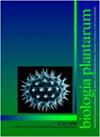过表达人参MYB4基因提高转基因拟南芥的抗逆性
IF 0.9
4区 生物学
Q4 PLANT SCIENCES
引用次数: 3
摘要
髓母细胞形成(MYB)转录因子在植物逆境应答中起重要作用。它们可以通过改善生理和生化反应,包括代谢物的积累,增强植物对非生物胁迫(如干旱、盐度和寒冷)的耐受性。本研究构建了人参MYB4 (PgMYB4)基因表达载体,建立了稳定的转基因拟南芥品系,研究了该基因对植物抗逆性的影响。pgmyb4过表达植株的发芽率和幼苗主根长度均高于野生型植株。因此,PgMYB4在拟南芥中的过表达增强了幼苗对干旱、盐和寒冷条件的耐受性。干旱胁迫下,转基因植株相对叶绿素含量下降幅度较小,脯氨酸含量增加幅度较大,水分流失率下降幅度较大。在转基因拟南芥植株中,脱水响应基因19A、脱水响应基因22、干燥响应基因29A、冷调控基因15A、冷调控基因47和吡咯啉-5羧酸合成酶1的表达量均显著上调。在高盐胁迫下,转基因植株的激酶1 (KIN1)表达显著上调。在低温胁迫下,转基因拟南芥脱水响应元件结合蛋白2A和KIN1的表达显著增加。因此,PgMYB4正调控胁迫耐受基因网络,促进抗胁迫效应基因的表达。该基因可用于培育具有较强抗逆性的人参新品种。本文章由计算机程序翻译,如有差异,请以英文原文为准。
Overexpression of the Panax ginseng MYB4 gene enhances stress tolerance in transgenic Arabidopsis thaliana
The myeloblastosis (MYB) transcription factors are essential for plant stress responses. They can enhance plant tolerance to abiotic stresses (e.g., drought, salinity, and cold) via improved physiological and biochemical responses including the accumulation of metabolites. In this study, we constructed a Panax ginseng MYB4 (PgMYB4) gene expression vector and established the stable transgenic Arabidopsis thaliana lines to study the effects of this gene on plant stress tolerance. The germination rate and seedling taproot length were greater for the PgMYB4-overexpressing plants than for the wild-type plants. Accordingly, the overexpression of PgMYB4 in Arabidopsis enhanced seedling tolerance to drought, salt, and cold conditions. Under drought stress, the relative chlorophyll content decreased less, the proline content increased more, and the water loss rate decreased more in the transgenic plants than in the wild type. The expressions of stress-related genes responsive to dehydration 19A, responsive to dehydration 22, responsive to desiccation 29A, cold-regulated 15A, cold-regulated 47, and pyrroline-5-carboxylate synthase 1 were significantly upregulated in the transgenic Arabidopsis plants. Under high salt stress, the kinesin 1 (KIN1) expression was significantly upregulated in the transgenic plants. In response to the low temperature stress, the dehydration-responsive element binding protein 2A and KIN1 expressions increased dramatically in the transgenic Arabidopsis plants. Thus, PgMYB4 positively regulated the stress tolerance gene networks, which promoted the expression of anti-stress effector genes. This gene may be useful for ginseng breeding programs aiming to develop new cultivars with enhanced stress tolerance.
求助全文
通过发布文献求助,成功后即可免费获取论文全文。
去求助
来源期刊

Biologia Plantarum
生物-植物科学
CiteScore
2.80
自引率
0.00%
发文量
28
审稿时长
3.3 months
期刊介绍:
BIOLOGIA PLANTARUM is an international journal for experimental botany. It publishes original scientific papers and brief communications, reviews on specialized topics, and book reviews in plant physiology, plant biochemistry and biophysics, physiological anatomy, ecophysiology, genetics, molecular biology, cell biology, evolution, and pathophysiology. All papers should contribute substantially to the current level of plant science and combine originality with a potential general interest. The journal focuses on model and crop plants, as well as on under-investigated species.
 求助内容:
求助内容: 应助结果提醒方式:
应助结果提醒方式:


